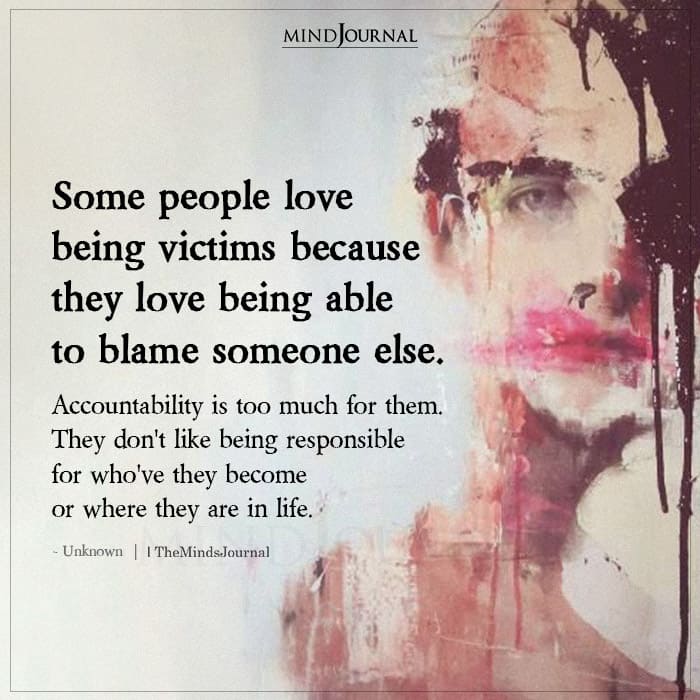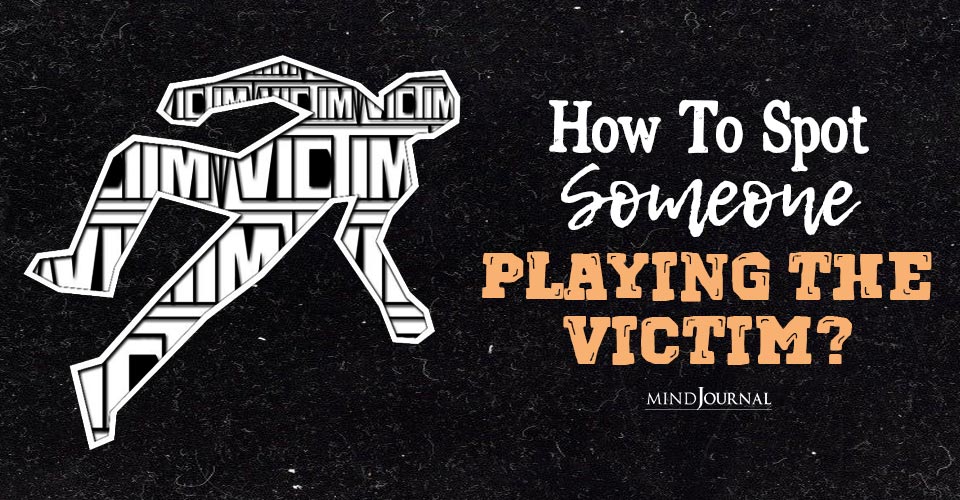Unfortunately, victim playing rarely results in getting what you want. Observe six signs of someone playing the victim and how to avoid narcissists.
Not all victims are manipulative. Feeling like a victim has taken on negative connotations, but there are people who ”play the victim” in order to manipulate you.
This is a favorite defense of narcissists and other personality-disordered people. In some other instances, this behavior is learned as a child because as a way to get needs met. I refer to them here as “actors.”

Sometimes, actors act consciously and more often it’s unconscious and automatic, like most of our defense mechanisms.
Related: The Effects Of Gaslighting In Narcissistic Victim Syndrome
Codependents and empaths with poor boundaries are easily manipulated and can end up in long-term relationships with a narcissist or someone who uses this tactic. They suffer from guilt and blame, hurt and resentment that their needs and feelings aren’t being considered.

Related: The Victim Identity: Signs And How To Recover
6 Signs Someone Is Playing The Victim

Here are some signs you’re being played by an actor:
- They don’t take responsibility. When we feel like a victim, we externalize the source of our pain, so we’re not accountable. Narcissists never want to take responsibility because it tarnishes their image of perfection, which is really all a defense to hidden shame.
- They try to shift the blame to you — anything to not take responsibility for their own mistakes or shortcomings. When you first meet a narcissist notice if they blame other people.
Soon you’ll be on their hit list. If they can make you feel guilty, they can gain power over you, which is what they want. The bonus is that you relieve their shame. You’re not responsible for other people’s feelings, much less their actions and words. - They don’t take in your care and compassion. They have to keep up the complaining and victimhood act for more attention. They want power and attention more than sympathy. A real victim will appreciate your concern, and it usually uplifts them and can enable them to take self-directed action.
- They often try to get you to do something to fix their pain. This is a fool’s errand because even if you were able to, which you’re not, they won’t appreciate it. Their need for a narcissistic supply is bottomless. Remember, they’re invested in being the victim. They can’t credit you for your success, because they want all the praise and sympathy.
- They’re solely focused on their problems and minimize or ignore your needs and feelings. What they want is your attention, and don’t want to get side-tracked by focusing on you or their children.
- They’re master manipulators. Often their manipulation is covert, like when they play the victim. Notice subtle put-downs and how they deftly avoid answering questions about their behavior and shift responsibility for problems and your complaints to you.
Playing the victim is only one of many defenses and tactics that abusers and narcissists use. There are many ways to manipulate. Learn to spot them all and how to respond effectively in Dating, Loving, and Leaving a Narcissist: Essential Tools for Improving or Leaving Narcissistic and Abusive Relationships.
Start giving yourself the empathy you deserve, and set boundaries with manipulators.

© 2022 Darlene Lancer
Don’t let a narcissist weaponize their victimhood. Understand the clear signs of victim manipulation. And if you’ve dealt with someone like this, share your thoughts in the comments below!
Related: How A Narcissist Love Bombs His Victim Into Submission
Written By: Darlene Lancer
Originally Appeared On: What Is Codependency










Leave a Reply